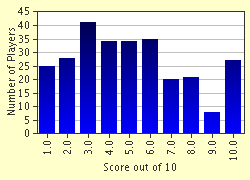Quiz Answer Key and Fun Facts
1. He spent six weeks in an asylum and wrote: "When maidens such as Hester die / Their place ye may not well supply, / Though ye among a thousand try / With vain endeavour."
2. The first time he asked his wife to marry him, she refused. He wrote: "My sister Adah. - All the stars of heaven, / The deep blue noon of night lit by an orb [. . . ] / All these are nothing, to my eyes and heart, / Like Adah's face: I turn from earth and heaven / To gaze on it."
3. He was charged with uttering seditious statements, but he was acquitted. He wrote these lines: "Mock on, mock on, Voltaire, Rousseau; / Mock on, mock on; 'tis all in vain! / You throw the sand against the wind, /And the wind blows it back again."
4. He separated from his wife in 1805 and gave lectures on politics, history, Shakespeare, Milton, and poetry. He wrote: "The primary IMAGINATION I hold to be the living power and prime agent of all human perception, and as a repetition in the finite mind of the eternal act of creation in the infinite I AM."
5. He worked as a lawyer's apprentice, a sheriff's deputy, and a Clerk of the Court. He wrote: "And said I that my limbs were old, / And said I that my blood was cold, / And that my kindly fire was fled, / And my poor withered heart was dead, / And that I might not sing of love?"
6. He succeeded Southey as poet laureate of England. He wrote: "I have said that poetry is the spontaneous overflow of powerful feelings: it takes its origin from emotion recollected in tranquility..."
7. After his expulsion from Oxford, his father demanded that he return home and profess conformity to the Church, or be cut off from all financial support. He wrote: "Monarch of Gods and Demons, and all Spirits / But One, who throng those bright and rolling worlds / Which Thou and I alone of living things / Behold with sleepless eyes!"
8. He was born the son of a poor tenant farmer. He was the father of several illegitimate children, and he wrote: "O my Luve's like a red, red rose, / That's newly sprung in June: / O my Luve's like the melodie, / That's sweetly play'd in tune. "
9. One of his brothers died of tuberculosis, the other moved to America. He wrote: "Thou still unravish'd bride of quietness, / Thou foster-child of silence and slow time, / Sylvan historian, who canst thus express / A flowery tale more sweetly than our rhyme."
10. She grew up learning from her father's peers, including Hazlitt, Lamb and Coleridge. She began writing her greatest novel at the age of 18. She wrote: "I am by birth a Genevese; and my family is one of the most distinguished of that republic. My ancestors had been for many years counselors and syndics; and my father had filled several public situations with honour and reputation."
Source: Author
skylarb
This quiz was reviewed by FunTrivia editor
MotherGoose before going online.
Any errors found in FunTrivia content are routinely corrected through our feedback system.


